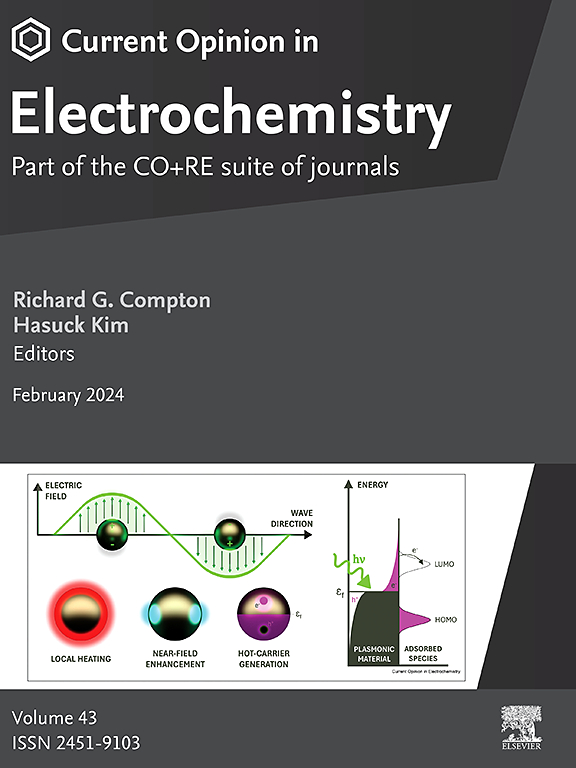Effects of electrolyte cations on the oxygen evolution reaction
IF 6.9
2区 化学
Q1 CHEMISTRY, PHYSICAL
引用次数: 0
Abstract
The oxidation of water to molecular oxygen, referred to as the oxygen evolution reaction (OER), is often the kinetic bottleneck in the formation of renewable fuels. The rate of the OER is strongly dependent on electrolyte properties, such as pH, ionic strength, and the identities of anions and cations. To advance OER catalysis, it is essential to understand the mechanisms by which the electrolyte influences the rate of the OER. In this article, we discuss recent work concerned with the effects of electrolyte cations on the OER. We examine how cations modulate apparent Arrhenius parameters, their effects on the interfacial water structure, their direct interactions with intermediates, and how they alter the rate through non-kinetic effects. The survey reveals that cations can influence the OER through a diversity of mechanisms and that their effects strongly depend on catalyst composition and reaction conditions.

电解质阳离子对析氧反应的影响
水氧化为分子氧,称为析氧反应(OER),通常是形成可再生燃料的动力学瓶颈。OER的速率很大程度上取决于电解质的性质,如pH值、离子强度以及阴离子和阳离子的特性。为了推进OER催化,必须了解电解质影响OER速率的机制。在本文中,我们讨论了最近有关电解质阳离子对OER的影响的工作。我们研究了阳离子如何调节表观阿伦尼乌斯参数,它们对界面水结构的影响,它们与中间体的直接相互作用,以及它们如何通过非动力学效应改变速率。调查表明,阳离子可以通过多种机制影响OER,其影响在很大程度上取决于催化剂的组成和反应条件。
本文章由计算机程序翻译,如有差异,请以英文原文为准。
求助全文
约1分钟内获得全文
求助全文
来源期刊

Current Opinion in Electrochemistry
Chemistry-Analytical Chemistry
CiteScore
14.00
自引率
5.90%
发文量
272
审稿时长
73 days
期刊介绍:
The development of the Current Opinion journals stemmed from the acknowledgment of the growing challenge for specialists to stay abreast of the expanding volume of information within their field. In Current Opinion in Electrochemistry, they help the reader by providing in a systematic manner:
1.The views of experts on current advances in electrochemistry in a clear and readable form.
2.Evaluations of the most interesting papers, annotated by experts, from the great wealth of original publications.
In the realm of electrochemistry, the subject is divided into 12 themed sections, with each section undergoing an annual review cycle:
• Bioelectrochemistry • Electrocatalysis • Electrochemical Materials and Engineering • Energy Storage: Batteries and Supercapacitors • Energy Transformation • Environmental Electrochemistry • Fundamental & Theoretical Electrochemistry • Innovative Methods in Electrochemistry • Organic & Molecular Electrochemistry • Physical & Nano-Electrochemistry • Sensors & Bio-sensors •
 求助内容:
求助内容: 应助结果提醒方式:
应助结果提醒方式:


